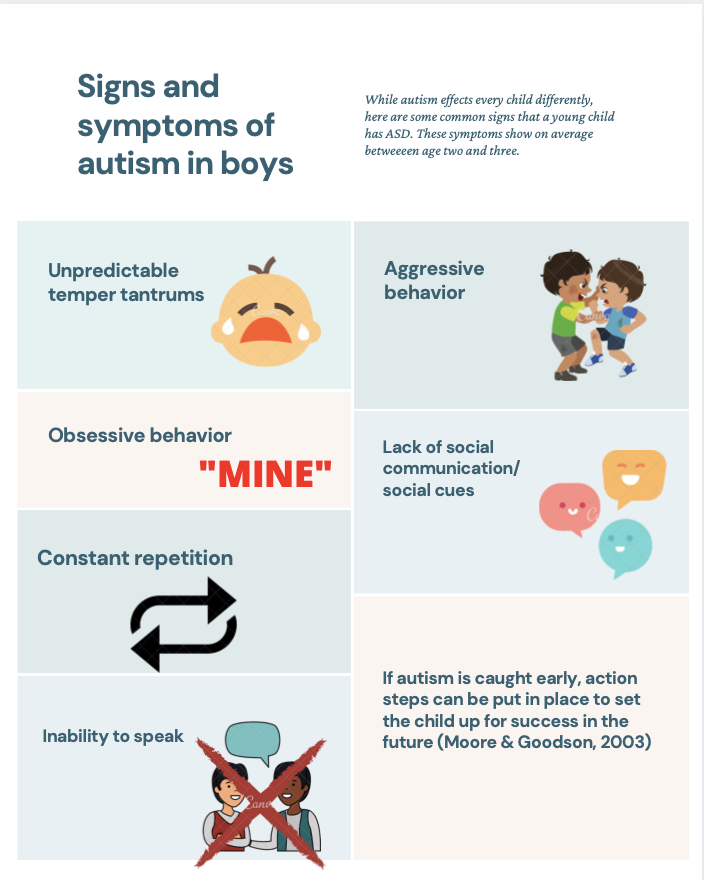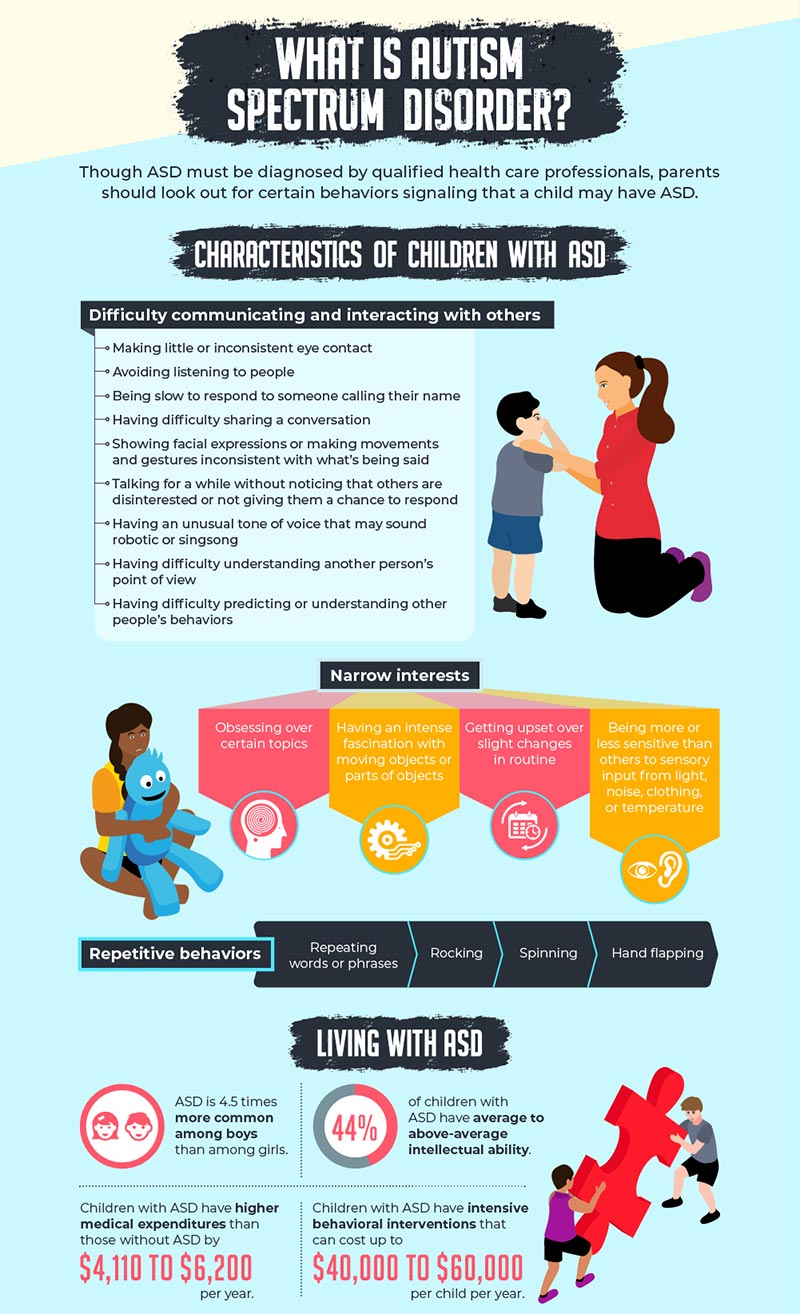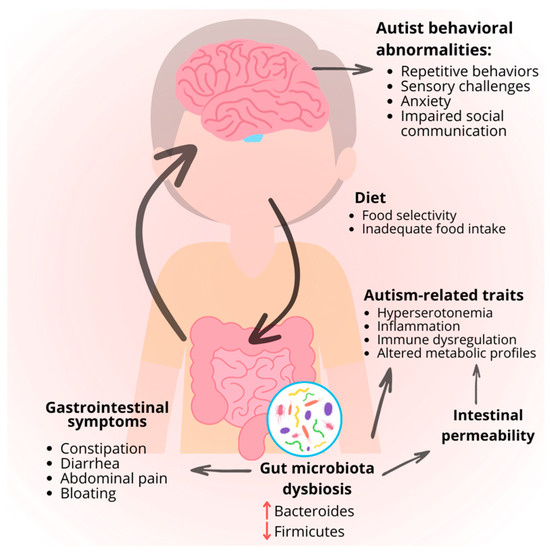With the help of Autism Behavioral Therapy, families can unlock independence in daily routines
With the help of Autism Behavioral Therapy, families can unlock independence in daily routines
Blog Article
Secret Indications and Symptoms to Acknowledge in People With Behavioral Autism
When you encounter a person with behavior autism, identifying key symptoms and signs is crucial. You might see obstacles in social communications and interaction, as well as a strong requirement for routines. Furthermore, sensory level of sensitivities can lead to overwhelming experiences. Understanding these characteristics can enhance your support and treatments, but there's more to discover about how these habits manifest in everyday circumstances. Allow's discover what these indications truly appear like.
Challenges in Social Communications
When you interact with someone on the autism range, you could discover they have a hard time with social hints and interaction. These difficulties can make social communications feel overwhelming for them.
When they do involve, they may chat regarding their rate of interests in wonderful information without discovering if you're interested. Understanding these obstacles can assist you approach interactions with empathy and perseverance, cultivating an extra comfortable setting for both of you.
Problem With Verbal and Non-Verbal Communication

Non-verbal communication can be also much more difficult. You may see a lack of eye contact or restricted use gestures, which can make interactions really feel unpleasant. Facial expressions may not always align with the conversation, resulting in confusion concerning their feelings. Acknowledging these indications is crucial, as it aids you better assistance and involve with individuals on the autism spectrum. By recognizing their communication obstacles, you can promote much more purposeful links and supply a more supportive atmosphere.
Repetitive Actions and Routines
Communication challenges typically come with various other indications of autism, such as repetitive habits and a strong preference for routines. You might see that people with autism frequently participate in particular, repetitive activities, like hand-flapping, rocking, or duplicating expressions. These actions can give convenience and a feeling of control in an usually frustrating globe.
When they adhere to a structured schedule,Regimens are just as vital; many people prosper. You might find that modifications to these regimens can lead to considerable distress. As an example, if they have an everyday routine of consuming breakfast at a specific time or adhering to a particular route to college, any type of interruption can create anxiousness.
Recognizing these patterns assists you recognize their actions and supply support. By accommodating their demand for routine and enabling repeated activities, you can create a much more comfortable environment that alleviates their obstacles.
Sensory Level Of Sensitivities

Usual Sensory Triggers
Sensory sensitivities can considerably impact everyday life for people with autism, as particular stimulations usually cause overwhelming reactions. Typical sensory triggers consist of loud sounds, intense lights, and strong smells. You might observe that abrupt audios, like alarms or alarms, cause stress and anxiety or distress. Similarly, fluorescent lighting in shops can really feel extreme and unpleasant. Structures can additionally play a substantial function; rough textiles or certain food textures might be intolerable for you. Furthermore, crowded places can overwhelm your senses, making it difficult to focus or relax. Recognizing these triggers can help you handle your environment better. By knowing what affects you, you can take actions to minimize pain and enhance your daily experiences.
Behavioral Actions Discussed
Understanding your behavioral feedbacks to sensory sensitivities is important, as they typically disclose just how you interact with the world. You might observe that specific sounds, lights, or appearances overwhelm you, leading to anxiety or discomfort. When faced with these stimulations, you may withdraw, cover your ears, or also respond boldy. These responses aren't simply quirks; they're your method of dealing with overstimulation. You may likewise find on your own seeking certain sensory experiences, like deep stress or silent settings, to aid ground yourself. Recognizing these patterns aids you recognize your needs much better and can assist exactly how you connect them to others. By recognizing your sensory sensitivities, you can function in the direction of producing an atmosphere that really feels extra manageable and comfortable for you.
Coping Techniques Summary
Recognizing your sensory level of sensitivities is just the very first action; currently it's time to discover coping strategies that can assist you handle those experiences efficiently. Start by producing a sensory toolkit customized to your demands. This can include noise-canceling headphones, fidget playthings, or relaxing aromas. Establishing an organized routine can also offer predictability, lowering anxiousness around sensory overload. When you really feel overwhelmed, take breaks in a silent space to regroup. Exercising mindfulness strategies such as deep breathing can aid ground you in the minute. Furthermore, communicate your requirements with those read the article around you; having supportive buddies and family members can make a significant distinction. Remember, discovering what functions finest for you may take time, so be open and patient to trying brand-new methods.
Limited Interests and Focus
While several people develop a large range of passions, those with autism often demonstrate limited passions get more and an intense concentrate on specific topics. You might see that somebody with autism can spend hours diving right into their preferred topic, whether it's a particular kind of train, a particular film, or a scientific concept. This intense focus isn't simply a hobby; it can become a main component of their identity and social interactions.
You may find that discussions rotate around these rate of interests, and they may struggle to take part in broader topics. For them, these focused rate of interests give comfort and a feeling of proficiency. While it is essential to encourage expedition of brand-new topics, respecting their interests is equally crucial. By comprehending and recognizing these limited interests, you can promote a helpful atmosphere where they really feel valued and recognized, allowing for more meaningful connections and interactions.
Psychological Law Troubles
Individuals with autism typically face difficulties in emotional guideline, which can be influenced by their extreme concentrate on details interests. You might observe that when an individual is deeply engaged in a preferred activity, they can experience solid feelings, whether exhilaration or aggravation. This strength sometimes makes it tough for them to shift gears or manage their feelings when things do not go as intended.

Variability in Developmental Landmarks
When it concerns developing milestones, you'll discover that individuals with autism frequently show a large range of variability. Some may strike milestones on time, while others could hang back or development at a various rate. You could see a youngster stand out in language abilities however battle with social communications. This disparity can be complex, as typical benchmarks don't constantly use.
It's crucial to recognize that each person's journey is distinct. Observing these patterns can assist you recognize their staminas and needs much better.
Regularly Asked Concerns
How Is Autism Identified in Children and Adults?
To detect autism in youngsters and adults, experts review behavior, communication abilities, and social communications. They usually utilize standardized examinations, meetings, and observations to establish if a private fulfills the standards for autism spectrum problem.
Exist Different Kinds Of Autism Range Disorders?
Yes, there are different kinds of autism spectrum problems, including Asperger's disorder and pervasive developmental disorder-not or else specified. Each kind varies in intensity and characteristics, so recognizing these distinctions can help you better support people with autism.
What Treatments Work for People With Autism?
When considering effective treatments for people with autism, you'll find choices like Applied Actions Analysis, speech therapy, and job-related therapy. Each technique can aid improve communication, social skills, and daily working customized to specific needs.
Can Individuals With Autism Lead Independent Lives?
Yes, individuals with autism can lead independent lives. With the appropriate support, abilities training, and sources, you can help them create self-sufficiency, manage daily tasks, and prosper in numerous environments, cultivating their self-reliance.
How Can Households Assistance Loved Ones With Autism?
You can sustain your liked ones with autism by producing an organized atmosphere, urging their interests, practicing patience, fostering communication, and promoting social skills. Celebrate their accomplishments, despite just how tiny, and construct a helpful neighborhood.
Although lots of people on the autism range can make use of and recognize language, they usually face significant challenges with both non-verbal and verbal communication. Acknowledging these indications is necessary, as it assists you much better support and involve with people on the autism range. You may notice that individuals with autism often engage in particular, repeated activities, like hand-flapping, shaking, or repeating phrases.Sensory sensitivities can significantly affect daily life for people with autism, as particular stimuli frequently activate overwhelming reactions.When it comes to developing turning points, you'll discover that individuals with autism typically show a wide array of irregularity.
Report this page